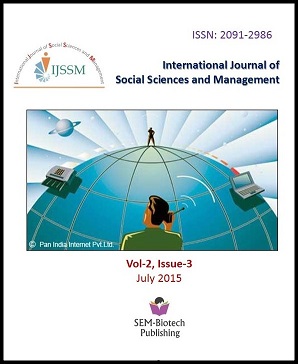Supportive Organisational Culture and Employee Job Satisfaction: A Critical Source of Competitive Advantage. A Case Study in a Selected Banking Company in Oxford City-UK.
DOI:
https://doi.org/10.3126/ijssm.v2i3.12551Keywords:
Organisational Culture, Job Satisfaction, Cleaning Industry, Communication, Motivation, Supervising, Growth Opportunity.Abstract
Banking jobs are becoming more and more lucrative and many people are joining the industry. Although numerous scholars have written more about the topic, many have failed to research into the banking industry on how organisational culture and employee job satisfaction can be used as a source of competitive advantage.
This study investigates on how the impact of organisational culture on employee job satisfaction can be a source of competitive advantage. Using a case study method, the paper derives quantitative data from the employees of a selected banking company in Oxford-city, a city the, United Kingdom. The selected banking company has four (4) branches in Oxford with 100 workers working in all the four branches.
A review of literature in two-fold: (i). Understanding supportive organisational culture and employee job satisfaction, and (ii). The impacts of organisational culture on the employee job satisfaction as a source of competitive advantage are conducted. This is followed by a summary of methodology and data analysis, ethical consideration and conceptual framework. Empirical analysis was conducted to determine the effects of organisational culture on employee job satisfaction as a source of competitive advantage. The empirical findings show that cultural traits of communication, motivation, growth opportunities and supervising support in organisations tend to make employees shift mind-set and help the firm in its competitive advantage. However, the discussion found out that employees within the company were not motivated enough to perform better due to lack of rewarding culture, growth opportunities (training) culture, communication and supervisory supportive culture.
Int. J. Soc. Sci. Manage. Vol-2, issue-3: 290-300
DOI: http://dx.doi.org/10.3126/ijssm.v2i3.12551
Downloads
Downloads
Published
How to Cite
Issue
Section
License
This license enables reusers to distribute, remix, adapt, and build upon the material in any medium or format for noncommercial purposes only, and only so long as attribution is given to the creator.




